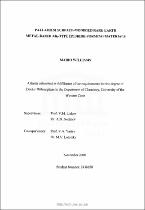| dc.description.abstract | Driven by mounting standards of living and a growing population, South African energy consumption is expected to increase dramatically within the next decade. The increased demand for more energy will require enormous growth in the capacity for energy generation, more secure and diversified energy sources, and a successful strategy to reduce greenhouse gas emissions. The wellbeing of the South African
economy depends on reliable and affordable supplies of energy; whilst environmental wellbeing, from improving urban air quality to abating the risk of global warming, requires energy resources that emit less greenhouse gases compared to petrochemicals. Amongst the various alternative energy strategies, building an energy infrastructure that utilises hydrogen as the primary energy carrier may enable a non-polluting energy security in the future, when it is produce using renewable energy sources (e.g. water electrolysis). Hydrogen has been acknowledged as a key element in the future generation of energy and will be essential in increasing and maintaining economic growth. The significance of hydrogen as a future energy source is due to its large abundance and an energy density that is three times greater than that of an average hydrocarbon fuel. Roughly 80% of hydrogen is produced by natural gas reforming, partial oxidation of light alcohols, and autothermal reforming. In addition, a number of alternative technologies exist in which hydrogen can be generated from starting materials such as coal; biomass; and water, including electrolysis, fossil fuel processing, and coal gasification. However, most of these technologies produce a hydrogen product which is of poor purity. Purification is achievable considering equipment costs are extremely high and the process is therefore mostly economically unfeasible. | en_US |

